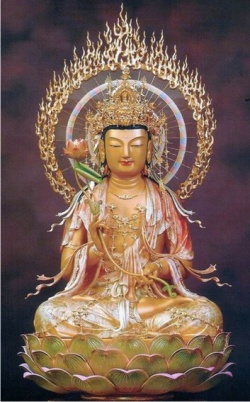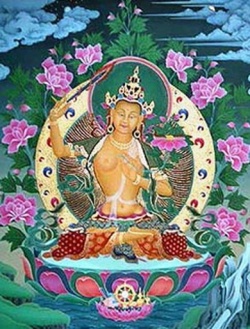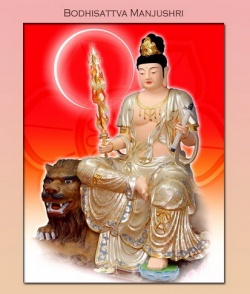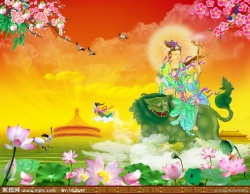Manjushri, also Sanskrit, means ''wonderfully lucky,'' or ''wonderful virtue''.
Manjushri, also Sanskrit, means wonderfully lucky, or wonderful virtue. Of the Bodhisattvas, he is foremost in wisdom and is also known as “The Great and Wise Manjushri.”
When the Bodhisattva Manjushri was born, ten auspicious signs manifested to indicate that his merit and virtue were complete and his wisdom foremost:
The room was filled with bright light. When Manjushri was born, a bright light filled the room. It was not the light of the sun, moon, stars or lamps. It represented Manjushri’s great Prajna wisdom and great intelligence which can disperse all darkness.
The vessels were filled with sweet dew. Sweet dew is the heavenly medicine of immortality which nourishes you and satisfies your hunger so that you don’t need to eat. Sweet dew satisfies, purifies, and refreshes. Hungry ghosts who have sweet dew poured over their heads immediately get rid of their offense karma and obtain a good rebirth. This is called “opening the sweet dew door.” When it opens, the hungry ghosts run in and obtain their fill. Sweet dew filling the vessels represents Manjushri’s use of the sweet dew of Dharma to rescue living beings.
The seven jewels came forth from the earth. When Manjushri was born, gold, silver, lapis lazuli, crystal, mother-of pearl, red pearls, and carnelian came forth from the earth.
Why are they called “jewels?” Because they are rare. Whatever is scarce is precious. Earth, for example, is actually very precious. Without it we couldn’t sustain our lives, and yet no one thinks it is special because there is a lot of it. If you tried to give people a handful of dirt, they wouldn’t want it; they’d just throw it away. Water, too, is essential for life, but no one prizes it because it’s everywhere. All living things depend on water for survival. Therefore Lao Zi said,
“The highest goodness, like water, benefits all things and yet does not contend. It goes to places men despise and so it is close to the Way.”
Water benefits all things, but doesn’t struggle. It would never say, “Hey, flower! Fortunately for you there is me, water, and so you have grown so big and bloomed so beautifully. Without me, flower, would this day have come for you? You really should be grateful.” It doesn’t think in this way and it doesn’t wrangle. Travellers will notice that water gathers in the lowlands, in places where men do not like to go. It lives where no one else wants to live and so it is close in its nature to the Way.
Water, fire, metal, wood, and earth benefit all things but because of their abundance, no one considers them precious. Trees are everywhere and so no one values them, but gold is a treasure because it is rare. In the Land of Ultimate Bliss, where the ground is made of gold, dirt would be valuable. If you gave a clod of Saha dirt to someone in the Land of Ultimate Bliss… Ah!… it would be as precious as those rocks they are now bringing back from the moon. They are just rocks, but because they came from the moon they are very valuable. If you sent a worthless clod of dirt to the Land of Ultimate Bliss everyone would exclaim, “Rare indeed!” So, the seven precious gems are called “jewels” because they are hard to find.
Manjushri Bodhisattva has limitless treasuries of jewels. When he was born, the seven jewels welled up from the earth – endless for the taking and inexhaustible in their use.
“Where are these treasuries?” you ask.
They are in the place where Manjushri was born.
“Can I go there?”
Don’t be so greedy. The travel expenses would cost more than the jewels you’d bring back. So don’t have this false thought.
The gods opened the treasuries. Wheel-turning Sage Kings have seven treasures: a golden disc, white elephants, jade women, horse, pearls, ministers of the army, and gods to guard his treasuries. These treasuries were buried in the earth long ago and then forgotten, but when Manjushri was born, the guardian gods opened the treasuries so that the jewels could be obtained.
Chickens gave birth to phoenixes. Chickens usually give birth to chickens, but when Manjushri was born they gave birth to Phoenixes. phoenixes are auspicious birds, and seeing one is a lucky sign.
In the Analects, Confucius wrote, “The phoenix hasn’t come and the river sends no map; I am finished.” The phoenix appears when a wise man rules and things are right in the world, as during the time of Emperor Shun (2255 B.C.) when these birds were commonly seen. During the time of [[Wikipedia:|]]Fu Xi (2852 B.C.) a turtle rose out of the river with a chart on its back. The chart gave Fu Xi the idea for the eight trigrams which combine to make the sixty-four hexagrams of the I Ching, the Book of Changes. “But now,” said Confucius, “one no longer sees such auspicious signs. Thus I know that it’s all over. To expound the Way and its virtue is of no use.”
Pigs gave birth to dragons. Dragons ordinarily give birth to dragons and phoenixes ordinarily give birth to phoenixes. It’s not too strange for chickens to hatch phoenixes, but then pigs gave birth to dragons – dragon pigs, with scales.
Horses gave birth to qilin. Horses usually beget horses, but they had qilin. Qilin, lions, and tigers are all called the “kings of beasts.”
The qilin is also an auspicious animal. In China, during the time of the benevolent Emperor Tang Di Yao (2356 B.C.), there were many phoenixes and qilins, and they were often seen. Later, when people’s karmic retribution grew too heavy, these auspicious creatures no longer appeared. Confucius wrote,
In the time of Emperor Tang Yao the qilin and phoenix abounded.
That time, however, is not the present, so what have you come to seek?
Qilin! Qilin! How my heart grieves…
“During the time of Emperor Tang Yao, qilins and phoenixes often came into the world to roam around; everyone saw them. But that time is not now, so what have you come to seek?” he said.
When the Sage Confucius was born, a qilin appeared. When his mother saw it, she tied a string around its neck. Near the end of Confucius’ life, some hunters killed a qilin. When Confucius saw it, he noticed that it had the string around its neck; it was the same qilin. Seeing this sign, he sighed deeply, for he knew that it would not be long before he died. “Qilin! Qilin! How my heart grieves…” he said.
When Manjushri was born, horses gave birth to qilins.
Cows gave birth to white zai . The white zai is an extremely rare and auspicious animal. It’s not like an ox and it’s not like a horse; it’s not like a deer or a mule. It’s not like anything at all. It looks like a horse, but has the hooves of an ox.
The grain in the granaries turned to gold. What use is golden grain? Can you eat it?
“You can exchange it for money and buy a lot of grain,” you may say.
I agree. A grain of gold is very valuable.
Elephants with six tusks appeared. Elephants usually have only two tusks, but when Manjushri was born they had six.
These are the ten auspicious signs which appeared at Manjushri’s birth. They represent the Ten Paramitas: giving, morality, patience, vigor, concentration, skill in means, vows, determination, and knowledge. They show that Manjushri is not like other Bodhisattvas.
If you would like to meet Manjushri Bodhisattva, you must first remember these ten signs. Then when you see him you will know, “This is my old friend and closest good knowing advisor.”
Manjushri will be very pleased. “Yes! You are my old friend, my very good friend,” he will say. Although he doesn’t discriminate, if you don’t know him, he won’t approach you. The better you know him, the closer he comes. Therefore we should know the states of the Bodhisattvas so that we can be their brothers and friends. All the Bodhisattvas are our good knowing advisors, and in the future we will be Bodhisattvas, too. So don’t take yourselves lightly.



